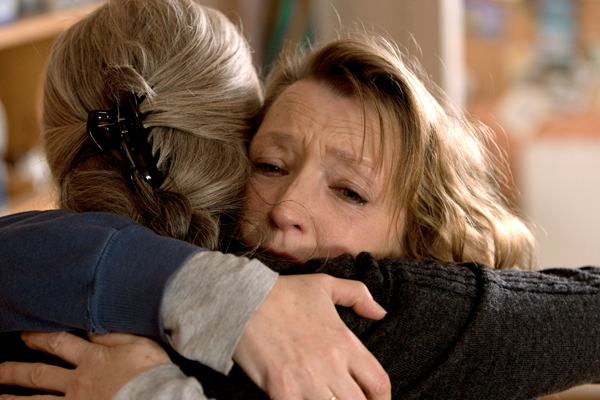|
Reviews of Recent Independent, Foreign, & Documentary Films in Theaters and DVD/Home Video

ANOTHER YEAR Aspirations inevitably fail (for those who are unlucky, or single). Director Mike Leigh sounds this bleak note again and again in this drama of overstatement. It’s first voiced by actress Imelda Staunton. Flushed, tight-lipped, and terse, she grudgingly sits in the office of the ever-patient Gerri (Ruth Sheen), a medical counselor, whom she barely takes in. She just wants something to help her sleep and rebuffs all of the routine questions about her life, family, and work. “What is the one thing that you would change in your life?” Her glib reply—she wants a new life because “Nothing changes.” Then the focus gingerly shifts to Gerri’s friend Mary (Lesley Manville), a secretary in Gerri’s office. At drinks after work, Mary lets her hair down, confiding to Gerri how content she is with her life, how much she likes her independence—she may even buy a car. But as she rattles on and on, is she simply sharing or, more likely, trying to convince herself of what she’s saying? With her soothing voice, Gerri’s constantly in therapist speak, adding words of encouragement for Mary to spill more. It’s not that Gerri doesn’t know she has a mess on her hands. She shares a knowing glance with her geologist husband Tom (Jim Broadbent) when they throw a dinner party in their modestly furnished, split-level suburban home. Their only guest: Mary. They could set their watches by when she begins to cry and completely break down, bemoaning the man who divorced her, among other slights. During a crying jag, Gerri offers Mary another glass of white wine, allowing Mary (and, later, another longtime friend) to wallow in tears and self-pity. Tough love is not in Gerri’s play book. Seasons change during the course of the film, but the neuroses don’t. In the summer, the couple invites Ken (Peter Wright), a once-handsome ladies man, for a weekend. He’s first seen chugging down beer on the train on his way there, and that’s just the warm up. Once he arrives, Gerri and Tom ply him with more beer while he confesses how he feels too old, too out of place at his local pub. It’s not too surprising that the couple attempt to match Ken with Mary during their backyard barbeque the next day, but Mary, still willowy, avoids contact with the bloated Ken. Luckily, Mary’s also soused on an afternoon bender, otherwise she may not have overlooked Gerri’s condescending recommendation that she “could try a culture holiday” for a change of pace. During this outing, you wonder how the other invited guests could forgive Gerri and Tom for subjecting them to Mary’s drunken stream-of-consciousness monologue—how she haggled over the price of her used car, how she got lost on the way, and on and on. The relationships between the disparate characters have been willed together by director Mike Leigh’s agenda, rather than organically. The logic of a screenwriter, and not the characters, drives the scenes. Leigh is noted for collaborating with his actors in creating characters before coming up with a story line. After months of improvisation and rehearsal, the willing cast goes with the flow, sometimes to questionable results. That Mary, Gerri, and the rest are wedged into rigid slots is nowhere better apparent than in the summer section when Gerri and her husband allow Mary to drive off after downing glass after glass of wine, with two passengers in tow, including their only son. A kindred spirit to the flailing Mary is Susan Kohner in Imitation of Life (1959)—she’s that film’s half-white, half-black, self-hating victim, who’s last seen wallowing in a filthy gutter. Leigh delivers the same treatment for Mary in almost a rebuke to contemporary pop culture. Single women over 40 who aren’t ever likely to make more than $40,000 a year: you won’t have it all, or even a little. Perhaps this wouldn’t come across so harshly if Mary hadn’t been written so pathetically, verging on a caricature. She’s so lonely that she lights up upon seeing Gerri’s 30-year-old son, Joe (Oliver Maltman), who looks younger, and coquettishly teases him to go out with her for a drink. (Both parents notice her come-on and say nothing.) When autumn arrives, Mary will meltdown, again with Gerri and Tom as an audience. But this time, they react, though belatedly, cutting her off from their lives. Her abrupt, rude behavior is too obvious for the couple, or the screenplay, to overlook. And in the battle of extremes, the fuming Mary meets her match in the scarily cheerful Katie (Karina Fernandez), her romantic competitor, or so Mary thinks. To make her even more delusional (as if that were possible), Leigh also cruelly matches Mary with a virtual cadaver, a monosyllabic widower immune and bewildered by her needy company. This occurs in the last section, set in winter, filmed in predictably washed-out colors for a slice of British kitchen-sink misery so airless and humorless it comes across like an art-house spoof even to the least jaundiced viewer. At first,
your heart will go out to Mary as she asks, “Why do I always get it
wrong, Gerri?” After two hours, though, she drains viewers’ energy,
sucking in all of the oxygen in her scenes. But a compelling question
hovers throughout: why are the eerily calm Gerri and Tom enablers, or
are they just sounding boards for Mary? While
she holds the film hostage, the couple commits a thoughtless act at a
funeral in such a quiet and confident way that their selfishness and
arrogance have gone under the radar for many critics. True, they’re the
voice of reason, at least compared to Mary, but they’re not infallible.
While Leigh painfully and redundantly spells out Mary’s problems, he
leaves the supposedly happy couple either as an enigma or anemically underwritten.
Kent Turner
|

